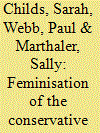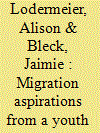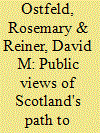|
|
|
Sort Order |
|
|
|
Items / Page
|
|
|
|
|
|
|
| Srl | Item |
| 1 |
ID:
092365


|
|
|
|
|
| Publication |
2009.
|
| Summary/Abstract |
Under David Cameron's leadership reforms have been made to the Conservative party's parliamentary selection procedures and distinct women's policy initiatives have been developed. This article, based on focus group data with party members, explores attitudes towards measures designed to recruit more women Conservative MPs. Broadly, we find that, despite widespread support for the principle of greater social diversity among PPCs, members are uncomfortable with the specific measures that have been introduced. This is largely on the grounds that anything approaching 'positive discrimination' should be eschewed in favour of the 'meritocratic' selection of candidates. Further, the members tend to resent central party 'interference' in what has traditionally been the domain of local Constituency Associations.
|
|
|
|
|
|
|
|
|
|
|
|
|
|
|
|
| 2 |
ID:
178005


|
|
|
|
|
| Summary/Abstract |
Mali has one of the highest migration rates in Africa, but we still know very little about the processes and drivers of migration – particularly in the context of the current political crisis. This article draws on 27 focus groups with 220 returnees and male youth respondents conducted in the summer of 2018. Respondents cite underemployment and the inability to provide for relatives as well as a feeling of hopelessness about a future life in Mali as drivers of migration. Returnees report that the voyage was more difficult than anticipated. However, even with knowledge of the significant risks they face, most (68%) returnees express a desire to try to migrate again: this is particularly true for returned migrants who failed in an attempt to reach Europe (89%). The research illustrates very different experiences for migrants attempting to reach Europe and those with goals of intra-African migration
|
|
|
|
|
|
|
|
|
|
|
|
|
|
|
|
| 3 |
ID:
176738


|
|
|
|
|
| Summary/Abstract |
Scotland offers a case study of a country with significant fossil energy resources that has seen rapid decarbonization and deployment of renewable energy. We review the key policies that facilitated a 47% reduction in greenhouse gas emissions from 1990 baseline levels and almost 75% of Scottish electricity being produced from renewable sources. Public views on climate policy, renewable energy, and low-carbon technologies are explored using focus groups we conducted in Aberdeen, Peterhead, and Edinburgh and citizens' juries in Aberdeen and Edinburgh. The deliberative processes reveal strong public support for continued diversification of Scotland's energy portfolio to include more renewable energy sources, particularly at the local level. We also found support for increased state involvement in the energy sector. Pro-renewables sentiments and skepticism of industry pervade even in Aberdeen, the main oil and gas hub, alongside support for further exploration of low-carbon emission technologies such as carbon capture and storage (CCS) that retain the ability to continue to use fossil fuels. Although Peterhead stood to benefit from a major CCS project, there was remarkably little awareness of the proposed project among residents. Finally, we argue deliberative processes can help both policy-makers and developers gauge where they can (and cannot) expect support.
|
|
|
|
|
|
|
|
|
|
|
|
|
|
|
|
| 4 |
ID:
186317


|
|
|
|
|
| Summary/Abstract |
Tax compliance is a major concern as states try to increase state revenues in order to provide services for their populations. Remarkably, taxation has not figured centrally on the agenda among scholars working on the African voter. This article contributes through studying the social practice of taxes, by asking: how is taxation understood as a political practice? This is studied using focus groups across the private and public sector in Namibia, where the willingness to pay taxes and the relative tax burden is high. This micro-study of citizens’ experiences focuses on the perceived room for political practice in relation to taxes, sense of influence over taxes and whether taxes are thought about in citizenship terms. The article shows that taxes are relegated to a sphere of politics where deliberation and opportunities for accountability are missing, yet ideas of duty are central elements of tax compliance.
|
|
|
|
|
|
|
|
|
|
|
|
|
|
|
|
| 5 |
ID:
143310


|
|
|
|
|
| Summary/Abstract |
Citizens increasingly occupy a central role in the policy rhetoric of British National Security Strategies, and yet the technocratic methods by which risks and threats are assessed and prioritized do not consider the views and experiences of diverse publics. Equally, security studies in both ‘traditional’ and ‘critical’ guises has privileged analysis of elites over the political subject of threat and (in)security. Contributing to the recent ‘vernacular’ and ‘everyday’ turns, this article draws on extensive critical focus-group research carried out in 2012 across six British cities in order to investigate (1) which issues citizens find threatening and how they know, construct and narrate ‘security threats’, and (2) the extent to which citizens are aware of, engage with and/or refuse government efforts to foster vigilance and suspicion in public spaces. Instead of making generalizations about what particular ‘types’ of citizens think, however, we develop a ‘disruptive’ approach inspired by the work of Jacques Rancière. While many of the views, anecdotes and stories reproduce the police order, in Rancière’s terms, it is also possible to identify political discourses that disrupt dominant understandings of threat and (in)security, repoliticize the grounds on which national security agendas are authorized, and reveal actually existing alternatives to cultures of suspicion and unease.
|
|
|
|
|
|
|
|
|
|
|
|
|
|
|
|
|
|
|
|
|